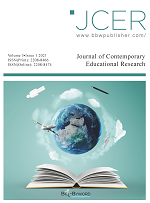Abstract
Adolescence is the golden stage for developing reading ability. Reading ability is an important factor in promoting teenagers’ know-how and cognitive structure. For teenagers who are at the stage of forming views on the world, life, and values, reading is a key part of understanding the external world. This study is an empirical analysis conducted on 210 teenagers through questionnaires to explore the influence of perceived value of social reading on teenagers’ reading ability by using the structural equation model. The results show that first, the perceived value of social reading affects teenagers’ reading ability; second, social reading motivation is the mediator of the above relationship; third, the perceived value of social reading affects teenagers’ reading ability through reading motivation. In regard to that, it is proposed that the characteristics of perceived value should be made use to stimulate students’ learning motivation and improve teenagers’ reading ability in the process of policy formulation of governmental departments and the teaching in schools.
References
Gu X, Feng Y, Hu S, 2015, Beyond Fragmented Learning: Semantic Graphing and Deep Learning. China Educational Technology, (03): 39-48.
Li W, 2017, A Study on the Influence of Perceived Value on User Satisfaction and Loyalty of E-Book Reading Clients. Journal of Library Science in China, 43(06): 35-49.
Xuan H, Dai T, Nin Q, et al., 2018, On the Influence of APP Marketing on Group Purchasing Behavior. Journal of Commercial Economics, (03): 103-106.
Zheng J, Tang S, 2017, An Empirical Study on Factors Influencing User Satisfaction of Teenagers’ Online Popular Science Channel Based on ACSI Model – Taking “Science Principle Learning” Channel as an Example. Studies on Science Popularization, 12(04): 43-52, 106.
Gu H, Liu J, Xia T, 2017, Influence of Family Socioeconomic on Primary School Students’ Reading Autonomy: Mediating Role of Parental Encouragement and Reading Motivation. Acta Psychologica Sinica, 49(08): 1063-1071.
Liu X, Zhang L, 2019, Study on the Influence of Social Reading Platform Characteristics and Perceived Value on Users’ Willingness to Continue Using. New Century Library, (12): 53-56.
Li J, 2017, A Study on the Effect of Social Reading on Reading Ability of Chinese Teenagers. China Publishing, (05): 21-25.
Saiyidi MR, Hadrian GD, 2021, Data Analysis with SPSS for Survey-based Research, 15-142.
Hu D, Zhu Z, 2020, Questionnaire Reliability Validity Test Based on SPSS and AMOS: A Study on the Relationship between Mathematical Anxiety, Mathematical Attitude and Mathematical Efficacy as an Example. Educational Measurement and Evaluation, (11): 3-7, 28.
Baron RM, Kenny DA, 1986, The Moderator-Mediator Variable Distinction in Social Psychological Research: Conceptual, Strategic, and Statistical Considerations. Journal of Personality and Social Psychology, 51(6): 1173-1182.
Chen M, 2016, Research on the Relationship between College Students’ Socialized Reading Motivation, Behavior and Social Capital. Shanghai Jiaotong University.
